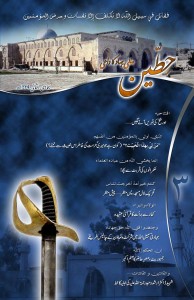[by Chipotle Mystery] Issue 3 of Hittin, an Urdu-language Jihadi journal, has been released. The issue includes:
- short reports on the Islamic State of Iraq and the Islamic Emirate of Afghanistan
- a eulogy of Mullah Dadullah, a major Taliban commander who was killed in May of 2007
- several articles that refer to the Red Mosque incident
- a collection of quotes from notable jihadi figures (e.g. Mullah Omar, Usama bin Laden, and Zawahiri) that is presented as inspirational advice for leaders
- an article on “methods” for engaging in jihad by the “Center for the Islamic Studies”
It’s telling that although this issue was published recently, it focuses on events that occurred in the middle of 2007. There is also older material. For example, this issue has a fatwa issued by Mufti Nizamuddin Shamzai in 2001 that justifies attacks on American soldiers in Afghanistan (he had issued a similar fatwa against the Soviets following their invasion of Afghanistan in 1979). Shamzai was a Pashtun cleric from Karachi who has been lionized in Al-Qaeda videos and who was assassinated by unknown assailants in 2004. He issued this fatwa just prior to the collapse of the Taliban government.
Going back even further, there is also an “article” by Jalaluddin Al-Suyuti, a 15th century Egyptian polymath who wrote on a variety of subjects ranging from theology to history (he wrote an interesting history of the caliphs). The article attributed to him warns against getting entangled with governments, likely meant to warn readers against assisting the Pakistani government in its anti-militant clampdown.
The publication of Hittin has been sporadic, with the first two issues being published in 2007 (March 2007 and then May-July 2007 after the Red Mosque siege). Although the length of the magazine has increased over time, it remains an eclectic collection of material, much of it recycled from elsewhere. This fact, coupled with the magazine’s dated material, indicates that either Jihadi Urdu-language e-journals are still in their infancy or that there is limited personnel for preparing such journals. The fact that it had to be distributed on Arabic-language forums also tells us that Urdu jihadi forums (if there are any) don’t yet have the infrastructure or following to disseminate it. As for the breadth of the magazine’s distribution in hard copy, that remains a mystery.
Document (Arabic): 10-31-8-faloja-issue-3-of-hittin






5 Responses
“As for the breadth of the magazine’s distribution in hard copy, that remains a mystery”
Or a Chipotle Mystery as it were.
I’m rather surprised to read that Urdu-Language jihadi publications are in short supply. Could it be that many Pakistani jihadis have an affinity for Arabic since it is the language of the Q’uran ,the Prophet and the belief that Arabic is spoken in heaven and thus viewing Urdu as unworthy of communicating their ideas in? I know many Saudis feel that Pakistanis are inferior and consider hearing Urdu being spoken as somewhat like listening to a donkey bray. I also know for a fact that in debating Pakistani jihadis that they really get ticked off of you call them “ghulam” since this is what many Arabs will address them as such in an insulting manner.
Very few people in Pakistan, jihadi or not, speak Arabic, therefore, I doubt that any special affinity for Arabic is behind the lack of Urdu resources. Most militant activities in Pakistan are carried out by Pashtuns and are hatched in the lawless Pashtun tribal belt, if anything, the primary language for actual Pakistani jihadis is likely Pashto. You will find most Taliban propaganda in Afghanistan aimed at Afghans is published in Pashto, it makes no sense to put it into Arabic as most Afghans, like Pakistanis, do not speak Arabic, lacking the resources of Western academics and psuedo-academics to spend a year in Jordan, Middlebury or purchase Rosetta Stone.
Hmmm . . . . maybe it can be attributed to the low literacy rate then. Thanks Chipotle.
By reading the above post i have come to know that in pakistan there is very less people who are jihadi, those who speak arabic.I doubt that any special affinity for Arabic is behind the lack of Urdu resources or it may be low litracy rate.